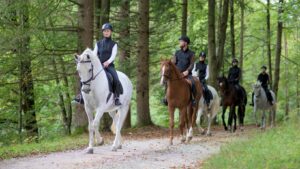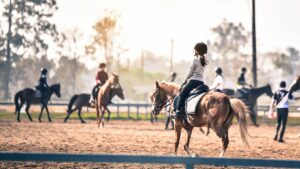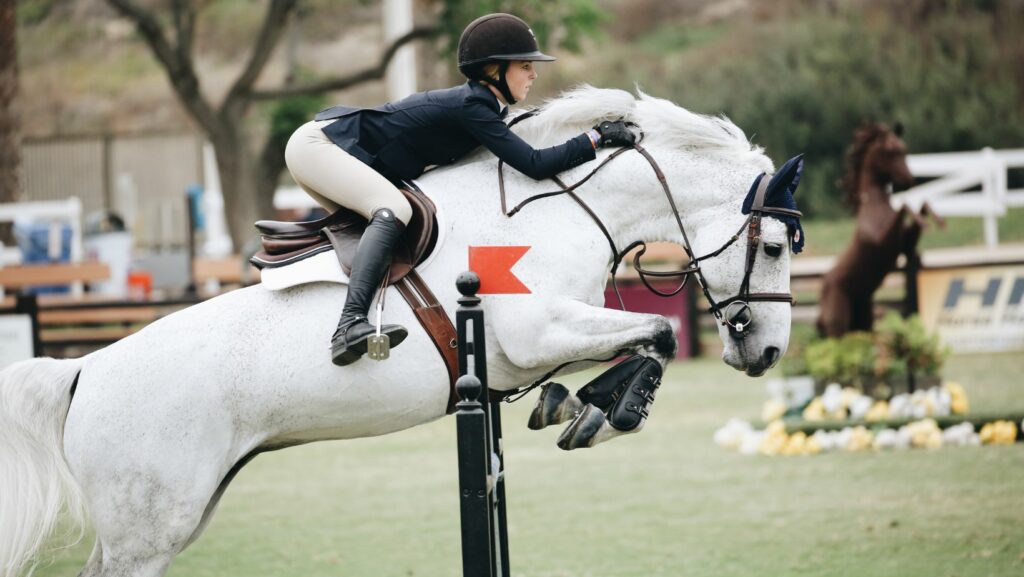At the intersection of athleticism and elegance, you’ll find the captivating world of sports horse lifestyle. It’s an existence punctuated by the rhythmic cadence of hooves, the thrill of competition, and the profound bond between human and horse.
Whether you’re an experienced equestrian or a curious novice, understanding the sports horse lifestyle is an intriguing journey. From the rigors of training to the exhilaration of the show ring, this lifestyle is a testament to the incredible synergy that can exist between man and beast. So tighten your girth and adjust your helmet, we’re about to delve into the fascinating realm of sports horse lifestyle.
Sports Horse Lifestyle
The Daily Routine of a Sports Horse
 A sports horse’s daily routine provides a glimpse into its intense lifestyle. It begins early, often at the break of dawn, and unfolds in an organized manner. Regular activities comprise stabling, grooming, feeding, and periods of rest. Exercise sessions punctuate the day, these involve workouts in the riding arena or long trots in the countryside. Besides physical care, mental stimulation remains crucial. Handlers spend time with the horses, enhancing social interaction and devising sensory enrichment activities, such as hanging toys in the horses’ stalls.
A sports horse’s daily routine provides a glimpse into its intense lifestyle. It begins early, often at the break of dawn, and unfolds in an organized manner. Regular activities comprise stabling, grooming, feeding, and periods of rest. Exercise sessions punctuate the day, these involve workouts in the riding arena or long trots in the countryside. Besides physical care, mental stimulation remains crucial. Handlers spend time with the horses, enhancing social interaction and devising sensory enrichment activities, such as hanging toys in the horses’ stalls.
Nutrition and Diet Essentials
Performance, in the realm of sports horse lifestyle, hinges significantly on optimal nutrition. A horse’s diet encapsulates a plethora of components, bearing both variety and specificity. Horses consume primarily forage, consisting of hay or grass, and grains like oats, corn, or barley. Besides, supplements cater to individual nutritional needs, enhancing protein intake, delivering essential minerals and vitamins, or even addressing specific health conditions. However, every feed plan adjusts according to the horse’s age, activity level, and health status, emphasizing the importance of individual dietary mapping.
The Importance of Proper Training
Training emerges as a keystone in a sports horse’s regimen, shaping its aptitude, attitude, and athletic prowess. A systematic training regimen hones a horse’s skills, instills discipline, and fosters resilience. Equine training encompasses a broad spectrum encompassing groundwork drills, lunging, flatwork, disputing obstacles, and specialized drills for specific equestrian disciplines. Coaches employ modern techniques grounded in science and psychology, prizing the horse’s understanding, engagement, and welfare. Hence, proper training sets the cornerstone for success in the sports horse lifestyle, paving the pathway for the horse and rider to ascend to excellence.
Health and Wellness in the Sports Horse Lifestyle
Routine veterinary care and maintenance represents a cornerstone in extending a sports horse’s lifespan, bolstering performance, and ensuring an optimal lifestyle. Regular vet visits ensure sports horses undergo thorough check-ups, vaccinations, and dental examinations. These visits also include preventative procedures, such as de-worming treatments, hoof care, and vaccinations. Neglecting regular vet visits can lead to the development of issues like lameness—deemed detrimental to a sports horse’s career.
Regular Veterinary Care and Maintenance
 Substantive vet visits keep sports horses in top shape. Professionals ensure vaccinations are up-to-date—warding off diseases like influenza and tetanus. Integrative health checks, including vital physical exams and blood tests, allow vets to monitor health parameters and detect anomalies. Dental checks warrant particular attention. Uneven wear or tooth problems can affect a horse’s eating habits, influencing its nutritional intake and performance. Routine hoof care, via trimming and shoeing, is crucial for proper movement and balance. Early detection turns crucial for effective treatment. For instance, arthritis signs include stiffness, reduced activity, and swelling in joints. Gastric ulcers may make a horse appear uncomfortable after eating, resulting in weight loss. Respiratory diseases often present with symptoms like nasal discharge or an increased respiratory rate. Immediate intervention minimizes any long-term impact on the sports horse’s performance and wellbeing.
Substantive vet visits keep sports horses in top shape. Professionals ensure vaccinations are up-to-date—warding off diseases like influenza and tetanus. Integrative health checks, including vital physical exams and blood tests, allow vets to monitor health parameters and detect anomalies. Dental checks warrant particular attention. Uneven wear or tooth problems can affect a horse’s eating habits, influencing its nutritional intake and performance. Routine hoof care, via trimming and shoeing, is crucial for proper movement and balance. Early detection turns crucial for effective treatment. For instance, arthritis signs include stiffness, reduced activity, and swelling in joints. Gastric ulcers may make a horse appear uncomfortable after eating, resulting in weight loss. Respiratory diseases often present with symptoms like nasal discharge or an increased respiratory rate. Immediate intervention minimizes any long-term impact on the sports horse’s performance and wellbeing.
The Mental Health of Sports Horses
The focus on physical wellbeing shouldn’t eclipse mental health. Engagement in activity beyond training promotes mental stimulation. Incorporating off-saddle activities like equine therapy and horse play fosters a healthy mental environment. Mental and emotional stress can mirror physical illnesses in symptoms, impacting a horse’s performance. Monitoring signs of such stress—changes in behavior, reluctance to train, or weight loss, for example—ensures sports horses maintain peak mental health alongside physical fitness. Regular engagement, bursts of freedom, and social interaction with other horses keep these regal athletes both physically fit and mentally stimulated.

